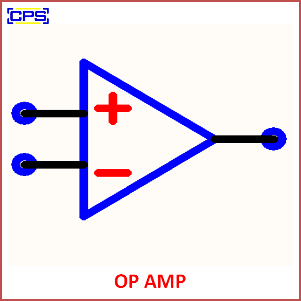An Operational Amplifier (commonly abbreviated as Op-Amp) is a versatile, high-gain electronic voltage amplifier designed to amplify input signals and perform mathematical operations such as addition, subtraction, integration, and differentiation. It is a fundamental building block in analog electronics.

Key Features of an Op-Amp:
- High Gain:
- Provides a very large voltage gain, typically ranging from thousands to millions.
- Differential Input:
- Has two input terminals:
- Inverting Input (−-−): Reverses the phase of the input signal.
- Non-Inverting Input (+++): Does not alter the phase of the input signal.
- Has two input terminals:
- Single Output:
- Produces an amplified output based on the difference between the two input signals.
- Ideal Characteristics:
- Infinite input impedance (prevents current flow into the input).
- Zero output impedance (allows maximum current delivery to the load).
- Infinite bandwidth (amplifies signals of any frequency).
- Infinite gain.
Common Configurations:
- Inverting Amplifier:
- Amplifies the input signal with a phase inversion.
- Non-Inverting Amplifier:
- Amplifies the input signal without phase inversion.
- Summing Amplifier:
- Combines multiple input signals into a single output.
- Differentiator:
- Outputs the derivative of the input signal.
- Integrator:
- Outputs the integral of the input signal.
Applications:
- Signal Amplification:
- Amplifies weak signals in audio systems, sensors, and instrumentation.
- Mathematical Operations:
- Performs addition, subtraction, integration, and differentiation in analog computing.
- Filtering:
- Used in active filters to control signal frequencies.
- Oscillators:
- Forms the basis of waveform generators and oscillators.
- Voltage Comparators:
- Compares two voltages and determines which is higher.
Advantages:
- High gain and precision.
- Versatile and widely applicable in analog and mixed-signal circuits.
- Compact and cost-effective.
Disadvantages:
- Performance depends on the external components and circuit design.
- Real-world Op-Amps deviate from ideal characteristics, such as finite gain and limited bandwidth.
In summary, an Op-Amp is a powerful and flexible component in analog electronics, used extensively for signal processing, control systems, and mathematical computations in a variety of applications.
